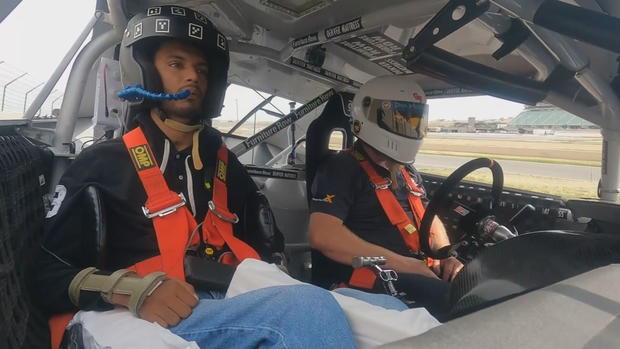Man Paralyzed From Waist Down Uses Microchip Implanted In Brain To Drive Race Car
FOUNTAIN, Colo. (CBS4) – The revving engine of a race car outside Fountain Wednesday morning was the sound of a major breakthrough in a technology that could one day change the lives of people who are mobility challenged. The man behind the wheel of the 850 horsepower NASCAR Cup race car was German Aldana Zuniga of Miami. Despite being paralyzed from the waist down, he used a microchip implanted in his brain to drive lap after lap.
"It's an amazing experience. Since my accident, I don't have mobility below my waist, so this is my first time driving a car," Zuniga said.
Nine years after a life-altering car wreck, Zuniga used his thoughts to drive Wednesday. It's a technological breakthrough pioneered by a team led by Dr. Scott Falci, a Colorado neurosurgeon with Health ONE's Falci Institute for Spinal Cord Injuries. The group also included electrical engineer Dr. Harry Direen, and Kevin Davis with the University of Miami Miller School of Medicine's Miami Project to Cure Paralysis.
For more than a year, they, along with others, worked tirelessly so Zuniga can communicate between a microchip on his brain and a computer in the car.
"The electrical changes get picked up on that electrode, travel down a cable underneath his skin to a little computer processor," Falci said.
"When the computer recognizes that particular fingerprint, it knows to send the signal to the computer in our race car and that computer knows to send it to the throttle and to actuate the throttle," said Falci.
For now, the technology allows Zuniga to use his thoughts to start the throttle and keep it at a steady pace. He can steer with a specialized helmet that registers his head movement, as well as slow down using a tube attached to the helmet known as a sip-n-puff input.
Because of all that, a task that was once unthinkable is now possible with focus and practice.
"It's unbelievable to think about being in the car, especially that fast. To be in it and watch how you go through the track smoothly and it responds to what you think, it's just incredible," Zuniga said.
According to Falci, the future possibilities for this technology are just as exciting.
"Our goal is not to make race car drivers out of spinal cord injured patients, it's really to apply this to real-world situations," said Falci.
"We can use this potentially for driving an electric wheelchair, a golf cart, control a robotic arm, control an exoskeleton device, control implanted medical device. Once we develop that science, that science can be used for all types of systems," he said.
It's a finish line Zuniga can't wait to help cross.
"Technology is advancing, so we have to help do our part in it and make it become available for everyone," Zuniga said.




